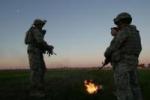I am doubtful as to whether this is the right way to go. PTSD screening is based solely on patient disclosure. It is not like a blood draw to look for an antibody, some soldiers have a pretty good idea what they can safely disclose and what they can not to either receive or avoid a PTSD diagnosis.
Reed

















Bookmarks